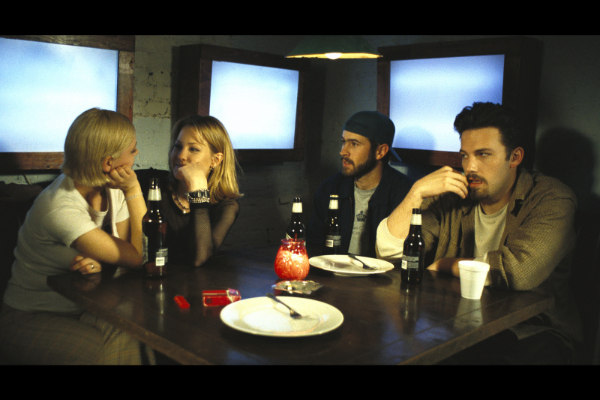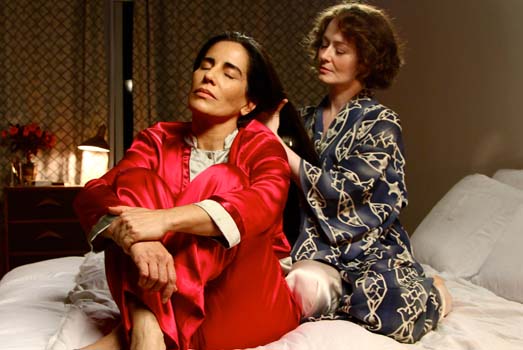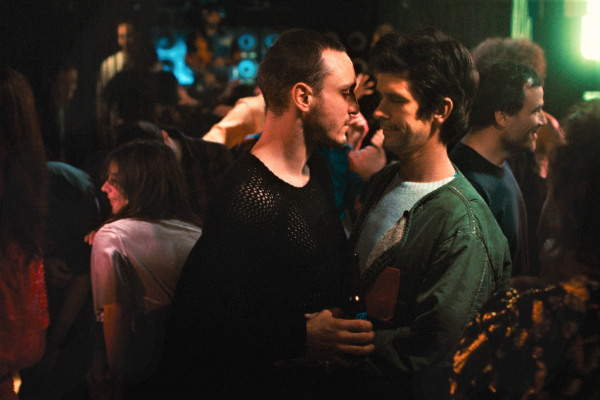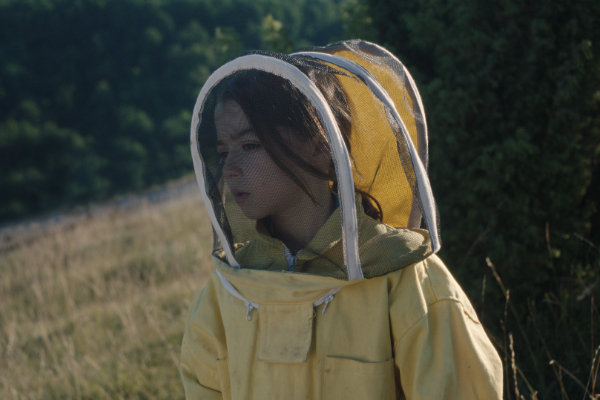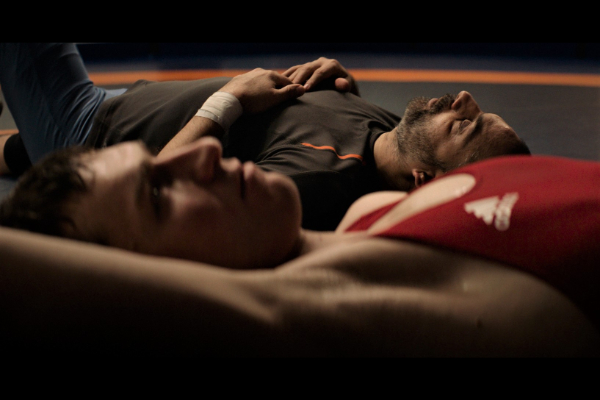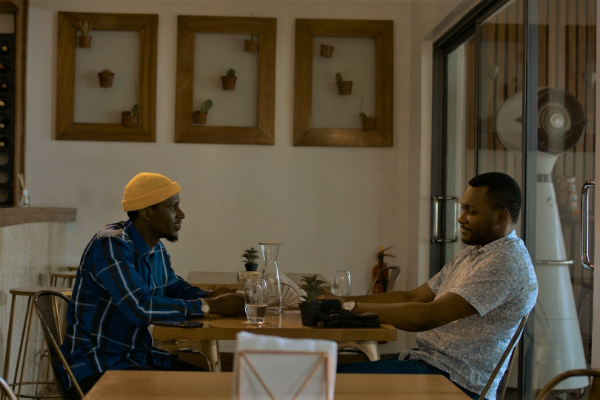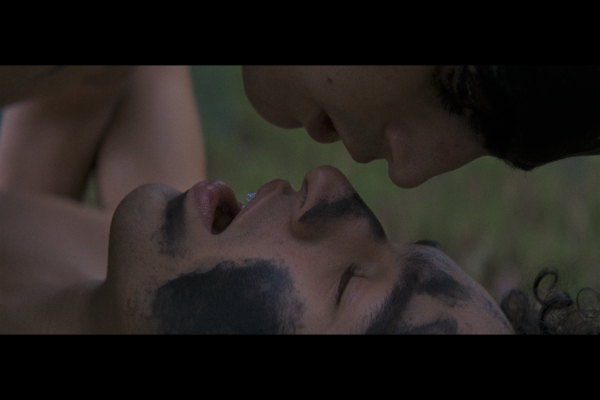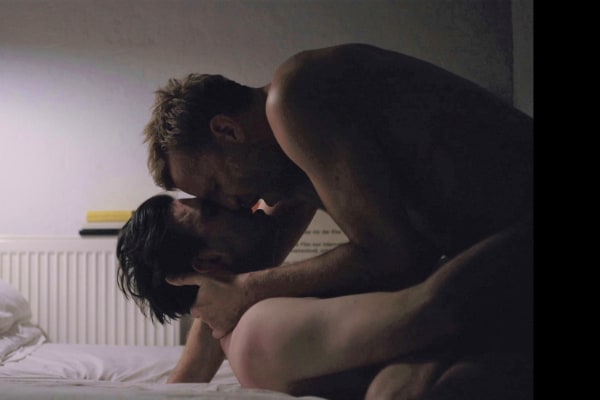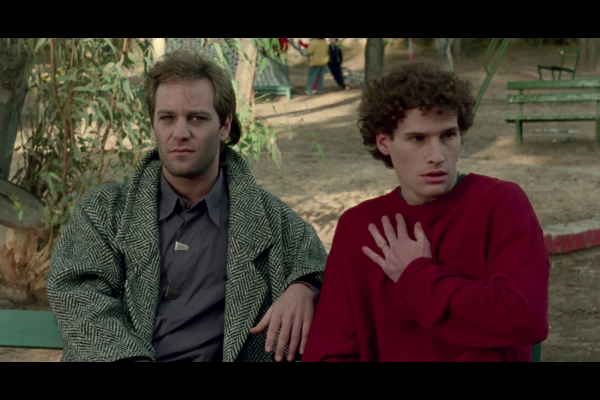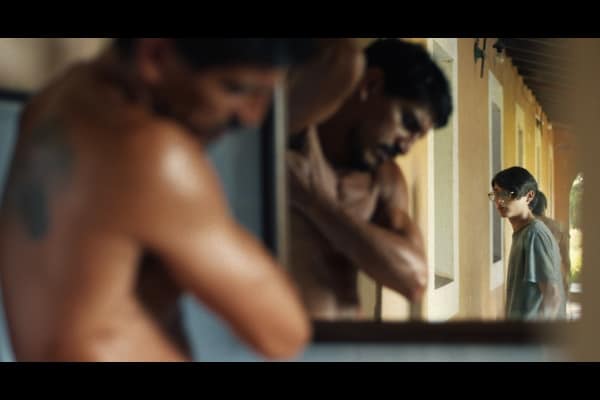Following Sav Rodgers’ wonderful documentary “Chasing Chasing Amy”, we had to screen Kevin Smith’s classic from 1997 (even though it didn’t age that well).
Is this film a lesbian fantasy of a straight man, or does it actually capture the nuances of a pansexual/bisexual identity better than many other films made even today?
A once in a lifetime performance by Joey Lauren Adams as the lesbian comic artist Ben Affleck’s character falls in love with (and she falls in love back). The film brings up questions about female sexuality and fluidity of sexual orientation that were ahead of their time back then and are still relevant today.
We highly recommend watching Sav Rodgers’ “Chasing Chasing Amy” which gives Smith’s classic film added layers and context.
Reaching for the Moon
.
Free entry with Cinematheque membership
.
A screening for the film’s 10th anniversary
The year is 1951 and the poet Elisabeth Bishop is looking for inspiration. She leaves her New York home and travels to sunny Rio de Janeiro to visit her old school friend Mary Morse. Elisabeth, with her closed off personality and conservative upbringing, is finding it hard to get used to the Brazilian sensuality, and especially to Marys’ partner – architect Lota de Macedo Soares (who will later design the famous Flamingo Park in Rio). Lota’s cold welcome to Elisabeth soon melts and she tries to convince Elisabeth to move in with her and Mary to their large mansion. Mary is reluctant but Lota wants both women to herself.
Elisabeth Bishop’s emotional poems are the heart of the film that follows an important chapter in the life of Pulitzer award winner. The film showcases wonderful performances by the Australian actress Miranda Otto as Elisabeth and Brazilian telenovelas star Gloria Pires as Lota. Special mention goes to the elegant and on point periodic reconstruction.
The film is based on a book by Carmen L. Oliveira.
In association with the Embassy of Brazil

Passages
Thomas is a German filmmaker, who is under a lot of pressure towards his last day of filming in Paris. In the evening there’s a party to celebrate the end of shooting. Thomas starts the night dancing with his British husband Martin, but ends it in the arms of Agathe, a young preschool teacher. She falls under Thomas’ spell and what starts as a flirtatious dance ends up as a passionate and surprising night. The next morning Thomas openly tells his husband he’s slept with a woman which throws the couple into a whirlpool of emotions that will change their life.
New York based gay filmmaker Ira Sachs (“Married Life”, “Love Is Strange”, “Keep the Lights On”) brings to the big screen an achingly beautiful film full of passion, a film full of laughter and sorrow about an unlikely throuple in Paris. This film stars some of the finest young actors of our age – Franz Rogowski (“Great Freedom”), Ben Whishaw (“Atlas Cloud”, “Paddington”), Adèle Exarchopoulos (“Blue is the Warmest Color”) and Erwan Kepoa Falé (“Winter Boy”).
Viewing is 18+ due to explicit sexual content.
20,000 Species of Bees
Estibaliz Urresola Solaguren’s increadible debut film entered the Berlin Film Fesitival’s official contest and earned its star – 10 years old Sofía Otero – Best Actress Award.
“20,000 Species of Bees” is a quaint family drama, its atmosphere can even be described as impressionist. The film was shot in the Basque region in northern Spain and follows the summer holiday of a mother and her three children. In their very traditional village, eight years old Lucia can no longer keep her secret inside.
Director Estibaliz Urresola Solaguren, in her debut full length film, creates a sunny and emotionally exposed drama. She takes her audience on an intimate journey with her heroines – the daughter, the mother, the grandmother and the rest of the women living and ruling the small Basque village. Those women are different and varied as the different species of bees.
Solaguren, who also wrote the script, handles the subject delicately and creates a natural feeling, almost a documentary one. The new up and coming actress Sofía Otero gives a gut wrenching performance that wouldn’t leave a dry eye in the audience.
In association with the Embassy of Spain


Opponent
Iman is a former wrestling champion, a refugee from Iran, who is now wandering between refugee hostels in Sweden with his wife Miriam and their two daughters. Iman has escaped his homeland Iran in fear of persecution after a violent crime he committed. He is looking for ways to provide his wife and daughters a place to live and works delivering pizzas on a snow motorbike.
When Miriam becomes unexpectedly pregnant for the third time, and the talks with the Swedish immigration become tougher, Iman decides to renew his wrestling career, despite the promise he made to his wife never to engage in the dangerous sport again.
Iman is hoping that being included in the Swedish team will earn him a special staying permit as a sportsman. As his skills are very much appreciated by the local team and also by one of his fellow teammates (Björn Elgerd, “Are We Lost Forever”), the deeper reasons that lead Iman to fleeing Iran are about to surface.
In his second film, director/screenwriter Milad Alami is aided by a superb cast lead by Payman Maadi. He creates a complex and layered social drama dealing with culture clashes, identities, and how the individual is getting lost inside the political.
Swedish submission for the Oscar Awards 2024.
In association with the Embassy of Sweden

![]()
All the Colours of the World Are Between Black and White
Bambino is a bachelor, living happily in Lagos, Nigeria. He works as a delivery driver and has a steady paycheck, even if the promotion he’s been long promised is held back. He is well regarded in his neighborhood, helping out as best he can and being generous when people are late to repay their debts. Bambino is in a relationship with his neighbor Ifeyinwa, but he’s not in any hurry to settle down with her. When Bambino meets charismatic Bawa the two become instant friends. He becomes a model for Bawa, who is taking part in a photography contest and the more they meet the more intimate the budding relationship becomes.
Director/screenwriter/producer Babatunde Apalowo brings to the screen a delicate, innocent and soft love story between two men, in a film about finding love where you least expect it.
“All the Colours of the World Are Between Black and White” is a very brave film, since homosexuality is a taboo and a criminal offense in Nigeria – in the south of Nigeria the punishment for homosexuality can reach 14 years in prison and in the Muslim north the punishment is public stoning.
.
This movie is eligible for a special “Monthly TLVfest” price:
4 Tickets – special price 160 NIS (40 NIS per ticket) – purchase here **
6 Tickets – special price 225 NIS (37.5 NIS per ticket) – purchase here **
12 Tickets – special price 360 NIS (30 NIS per ticket) – purchase here **
**NOT VALID for the TLVfest FESTIVAL screenings. Valid only for the Monthly TLVfest screenings.
The Lost Boys
In a juvenile reform center, Joe is getting ready for his return to society, but he’s not sure how life will be on the other side of the fence. When William, a new inmate, moves to the cell next to him, Joe’s desire for freedom is turning rapidly into a different kind of want.
Using Camera Obscura shots, ink paintings, dance and rap, William and Joe embark on a shared journey of self-discovery – both are surprised by the emotional and physical attraction to each other. When the desperation and longing around them grows, they find solace in each other.
Director/Screenwriter Zeno Graton’s debut film traces expertly the twists and turns of desire between two young men and offers an uncompromising vision of love. Even behind bars, an unexpected crush can lead to a freeing and moving love story.
In association with the Embassy of Belgium.


Bones and Names
Boris the actor and Jonathan the writer are a couple, but their relationship reached the point where they can spend their evenings together-apart – one in bed reading scripts and the other working at the office desk in the next room. Boris is sinking further and further into rehearsals for a new film with an ambitious director whose way of work starts to affect his personal life. Meanwhile Jonathan is trying to redefine his voice as a writer. The couple is experiencing a period of emotional distancing, betrayal of trust, fear of losing their relationship as well as fear of losing themselves in it.
This is the debut feature film of actor, screenwriter and director Fabian Stumm, and he shows that he is one of most interesting young voices in German cinema today. Stumm manages to turn what seems to be banal and everyday scenes – in the bedroom, supermarket or rehearsal room, into something unexpected in a film that is an intelligent and amusing takeout on relationships.
The Israeli audience will remember Knut Berger, who plays Jonathan in the movie “Walk on Water” (2004).
Amazing Grace
Newly-Restored Digital Copy of Amos Guttman’s final masterpiece.
Young Jonathan moves to the city, but can’t find happiness. He meets the older Thomas, who recently returned from years abroad and is hiding the fact he’s been diagnosed with AIDS. The two develop a tender relationship, yet only one of them knows that their time together is about to run out.
“Amazing Grace” was made in the early nineties, when AIDS and HIV were discussed in a very politically incorrect way. Nonetheless, it is still a very touching film, thanks to Guttman’s gentle direction and the excellent performance by the cast.
Amnon Zalait is responsible for the beautiful cinematography of the film and Arkadi Duchin for the wonderful original music. Excellent editing by Einat Glaser-Zarhin.
The New Digital Copy supported by Israel Film Fund, Mifal Hapais, Israel Film Archive Jerusalem, Maureen Friedman
Special thanks to Maureen Friedman.
Clip from “Amos Gutman, Filmmaker“
Almamula
14 years old Nino is only on the verge of sexual awakening, but he is already a victim of homophobic hate crime. In order to protect him, his parents decide to leave the city and temporarily move to a farm where Nino’s father works in deforestation. The farm is surrounded by a dark forest where, as the local legend goes, lives the Almamula – a mysterious creature that kidnaps anyone who’s a sexual sinner. So not only does Nino have to face his fear of the monster that might come and claim him, he also has to deal with the church meetings his mother forces him to go to and the local priest who attempts to bring him closer to God by force. Will a meeting with the farm’s gardener give Nino a surprising solution to his existential queries?
Juan Sebastián Torales’ debut film, whose world premiere was at the Berlin Film Festival, delivers a mystical, sensual, surprising and thought provoking cinematic experience on prejudice and its collision with modern thinking.
